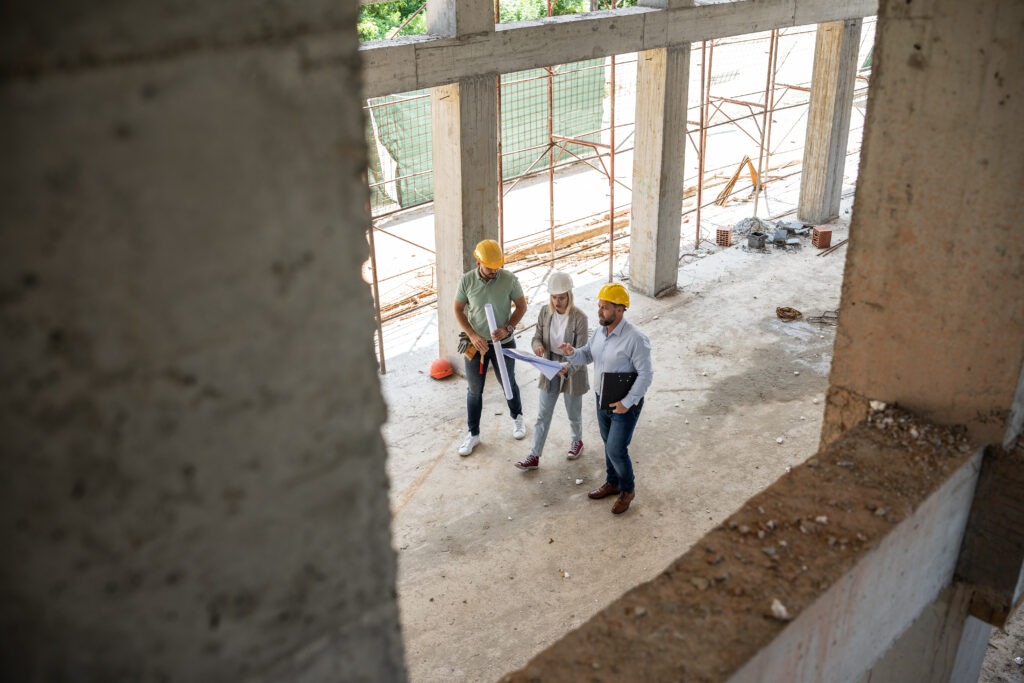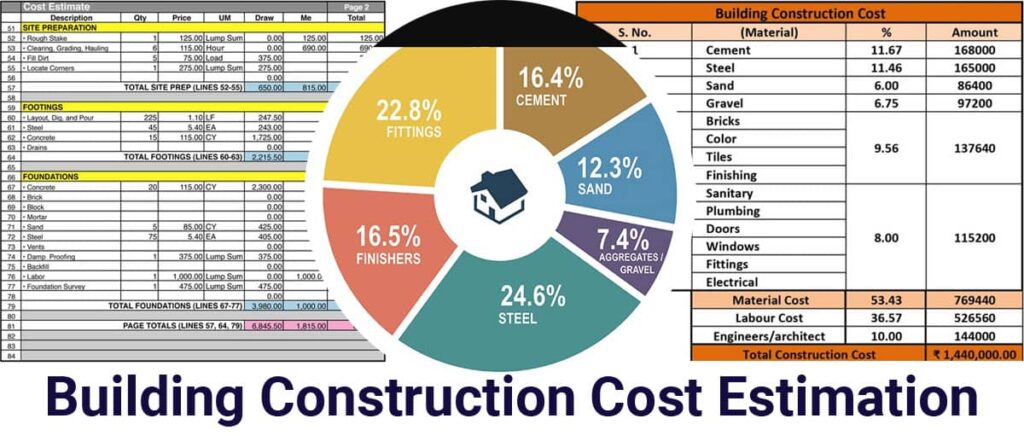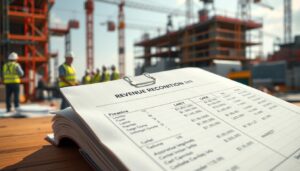Construction Cost Control and Management – Maximizing Profitability
In the dynamic world of the construction industry, effective cost control and management are key to project success and profitability. With construction input prices rising by 22.3% and nonresidential construction prices surging by 23.2%, it’s more critical than ever to implement robust construction budget strategies. These strategies help keep projects withinbudget. Construction cost management involves various processes, including risk management, procurement, cost cutting, resource allocation, and continuous oversight.

Comprehensive pre-construction planning is the cornerstone of successful cost control. This includes analyzing expenses such as materials, labor, equipment, permits, subcontractors, and contingencies. By clearly defining the scope of work, you can improve accuracy, reduce unforeseen expenses, and prevent costly scope creep. Throughout the project, constant monitoring and reporting of costs against the budget are essential to catch issues before they escalate.
Effective construction cost control can lead to improved bid-hit ratios, increased profitability, and enhanced customer satisfaction. By identifying and mitigating risks early, you can avoid overruns and delays. Optimized resource management and the allocation of labor, materials, and equipment at the right time and place are critical for project efficiency. Leveraging technology, such as construction management software and real-time reporting, can streamline cost tracking and control processes. This facilitates informed decision-making.
Key Takeaways
- Comprehensive pre-construction planning is essential for accurate cost estimation and control.
- Constant monitoring and reporting of costs against budget help catch issues early.
- Effective cost control can lead to improved profitability and customer satisfaction.
- Optimized resource management and allocation are critical for project efficiency.
- Leveraging technology streamlines cost tracking and control processes.
Introduction To Cost Control and Management
In the construction world, cost control and management are key to project success and profit maximization. Effective cost management requires strategies to keep expenses in line with budgets while ensuring quality. This proactive approach helps avoid cost overruns, reduces financial risks, and ensures timely and budget-friendly project delivery.
Recent data shows that about 82% of businesses focus on cost control for sustainable growth. A solid cost management process identifies wasteful spending and inefficiencies, boosting profitability. By streamlining operations and optimizing resources, companies can offer competitive prices without compromising quality.

Developing a detailed project plan is critical for effective cost control. This plan outlines the project’s scope, timeline, and budget, considering labor, material, and overhead costs. Proper planning and resource allocation help minimize cost variances, keeping the total cost within budget.
During construction, it’s vital to monitor and track expenses for cost control. Tools like job costing, WIP calculations, and EVM track project progress and detect cost overruns early. By comparing actual costs to budgeted amounts, managers can make timely adjustments to stay on track.
Effective cost control also involves managing indirect expenses and overhead costs. This includes optimizing procurement, negotiating supplier contracts, and adopting cost-saving measures like lean construction. Streamlining operations and reducing waste significantly improves profitability.
Risk management is also critical in construction management and cost control. Identifying and planning for risks like weather delays, material shortages, or labor disputes helps mitigate their financial impact. Proactive risk management minimizes cost overruns and ensures project smoothness.
In summary, effective cost control and management are vital for construction project success. Through robust planning, monitoring, and optimization, companies can enhance profitability, deliver projects on time and within budget, and maintain a competitive edge.
Understanding Construction Costs
Construction companies encounter numerous costs on a project. To achieve profitability and success, understanding these costs is vital. Knowing the different types of costs and how they change during a project is key. This knowledge helps in making informed decisions and to control costs effectively.
Types of Costs in Construction Projects
Construction costs are divided into direct and indirect costs. Direct costs are expenses directly linked to the project’s physical construction. These include:
- Cost of materials
- Labor costs
- Equipment rental or purchase
- Subcontractor fees
Indirect costs, on the other hand, are expenses that support the project but aren’t directly related to construction. Examples include administrative costs, legal fees, and security expenses. It’s critical to understand these categories for accurate budgeting and cost control.

Cost Dynamics Across Project Phases
The cost dynamics change significantly as a construction project moves through its phases. In the pre-construction phase, the focus is on creating a detailed cost estimate. This cost breakdown structure includes the material cost, labor, equipment, and contingencies for unexpected events.
During the construction phase, cost tracking is essential. Using cost codes helps categorize expenses for better analysis and future estimates. Monitoring and auditing costs in real-time is critical to prevent overruns and keep the project withinbudget.
As the project nears completion, project cost control and optimization become the main focus. This involves finding ways to reduce costs without compromising quality. Negotiating better deals with suppliers and using more efficient construction methods are examples. Understanding cost changes throughout the project lifecycle helps manage cash flow and maintain profitability.
The Role of Accounting in Construction Cost Management
Effective construction accounting and financial management are key to a project’s success. A solid cost controlprocess and accurate cost reports are vital through the project scope. They help construction companies boost profitability and ensure project financial health.
Construction projects have many cost accounts, with up to four hundred on a small project. A project budget, based on the initial cost estimate, guides cost control in the construction process. It includes job cost elements and accounts for expenses, with material and labor inputs tracked against expectations.
Strategic Financial Planning
Strategic financial planning is critical for construction projects. It involves organizing cost accounts into a hierarchical structure. This makes it easier to group costs into categories. A good numbering or coding system is essential for effective cost data aggregation.
Cost Tracking and Reporting
Accurate cost tracking and reporting are essential for managing construction finances. Databases and application programs are vital for accessing cost information. They help convert final cost estimates into project budgets that align with cost accounts. Regular reports can spot issues like cost overruns, enabling timely action.
Compliance and Tax Optimization
Construction accounting is also vital for regulatory compliance and tax optimization. Proper cost categorization is necessary for accurate allocations and compliance with accounting practices. Construction accounting software can streamline processes, reduce errors, and enhance communication. This improves project efficiency and profitability.
Strategies For Reducing Costs Without Sacrificing Quality
Implementing cost control methods is essential for avoiding cost overruns and ensuring a project’s success. By adopting effective cost management strategies, construction firms can enhance cost control and achieve notable cost savings. This can be done without compromising on quality.
Optimizing the procurement process is a key area to focus on. Building robust relationships with suppliers and negotiating better contracts can lead to significant cost savings. For instance, Central Carolina Scale cut their annual expenses by 28% by switching to a local family-owned store from a national chain.
Optimizing The Procurement Processes
Another effective strategy is to boost workforce productivity through training and technology adoption. Investing in your team’s skills and equipping them with the right tools can greatly enhance efficiency and reduce cost variance. Outsourcing non-core activities, such as accounting, marketing, or IT support, can also lower costs. This allows your team to concentrate on their core competencies.
Enhancing Workforce Productivity
Improving project scheduling is another critical aspect of effective cost management. Detailed planning, efficient resource allocation, and proactive risk management can prevent delays and cost overruns. Adopting lean principles and continuous improvement practices can also eliminate waste and streamline workflows.
Improving Project Scheduling
Adopting energy-efficient measures, such as smart lighting or advanced HVAC systems, can cut utility bills by up to 20%. Businesses installing solar systems before 2033 may also qualify for substantial tax credits. By implementing these strategies, construction companies can achieve significant cost savings while delivering high-quality projects.
How Jones CPA Group Can Help Construction Companies
Managing finances in the construction industry is complex and daunting. Challenges include slow payments, inconsistent cash flow, and the need for detailed budgeting. Jones CPA Group offers customized financial solutions tailored to construction companies’ unique needs.
At Jones CPA Group, we grasp the intricacies of construction accounting. Our team uses advanced construction and project management software. These tools, combined with our cost management practices, help you monitor and control projects effectively, ensuring maximum profitability.
Customized Financial Solutions
We understand that each construction company is unique. That’s why we provide customized financial solutions. Our services cover a broad spectrum, including:
- Financial management: budgeting, cash flow management, and financial reporting
- Tax compliance: minimizing tax liabilities while ensuring compliance
- Cost control: tracking project costs, analyzing variances, and identifying areas for cost reduction
- Financial analysis: providing financial statements, performing ratio analysis, and generating financial forecasts
Audit and Fraud Prevention
In the construction industry, audit and fraud prevention are vital. Our team at Jones CPA Group is well-versed in regulatory compliance. We ensure your company meets all necessary regulations, licensing, permits, and labor laws. We implement robust financial controls and risk management strategies to protect your business from fraud and financial irregularities.
Data-Driven Insights For Decision Making
Informed decision-making is key to construction project success. Our integrated project management approach provides data-driven insights to optimize operations. We use real-time financial data and advanced analytics to help you identify trends, forecast future performance, and make strategic decisions that drive your business forward.
At Jones CPA Group, we are dedicated to helping construction companies succeed in today’s competitive landscape. With our extensive experience and expertise in cost management practices, we are your trusted partner for maximizing profitability and achieving long-term success.
Summary
Accurate cost control and management are key for construction companies to boost profitability and complete projects on time. Understanding construction costs and adopting top accounting practices are essential. This allows for smoother operations and informed decision-making.
Effective cost control involves optimizing procurement, boosting workforce efficiency, and refining project schedules. These steps help cut expenses without sacrificing quality. Partnering with experts like Jones CPA Group offers tailored financial solutions and fraud prevention. They provide insights to enhance your construction business.
To manage costs effectively, companies must be proactive. This includes setting income targets, analyzing variances, and using EVM techniques. By comparing budgeted and actual costs, companies can pinpoint areas for improvement. This leads to better expense management and productivity.
Overcoming cost control hurdles, like inconsistent data and project changes, requires dedication. Reliable financial tools and strategies are vital. In conclusion, accurate cost control is vital for construction companies to thrive in today’s market. By understanding costs, adopting best practices, and working with experts, companies can optimize expenses and productivity. A proactive approach to cost control ensures long-term success and growth.
FAQ
What is cost control in construction projects?
Cost control in construction projects involves managing expenses to ensure work is done on time and within budget. It includes risk management, procurement, and cost-cutting strategies. It also involves allocating resources effectively and monitoring finances closely to maintain stability and client satisfaction.
Why is effective cost management important for construction projects?
Effective cost management is key to the success of construction projects. It uses methods like job costing and earned value management to track expenses and optimize resource use. This helps in identifying and preventing cost overruns, ensuring the project remains profitable.
What are the main types of costs in construction projects?
Construction costs are divided into direct and indirect expenses. Direct costs include labor, materials, and equipment. Indirect costs cover administrative and legal fees. Understanding these costs helps manage cash flow and ensure profitability.
How does accounting contribute to construction cost management?
Accounting is essential for managing construction costs. It involves financial planning, cost tracking, and compliance with regulations. Accurate financial data helps in identifying overruns and making informed decisions, ensuring cash flow and regulatory compliance.
What are some strategies for reducing costs without compromising quality in construction projects?
To reduce costs without sacrificing quality, focus on optimizing procurement and improving workforce productivity. Use technology and detailed planning to manage resources effectively. These strategies help prevent overruns and ensure project success.
How can Jones CPA Group help construction companies with cost management?
Jones CPA Group offers tailored financial solutions and audit services to construction companies. They provide data-driven insights to maximize profitability. Their expertise and technology solutions help streamline operations, mitigate risks, and inform decisions with real-time financial data.






